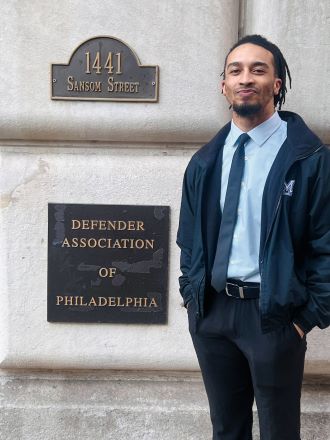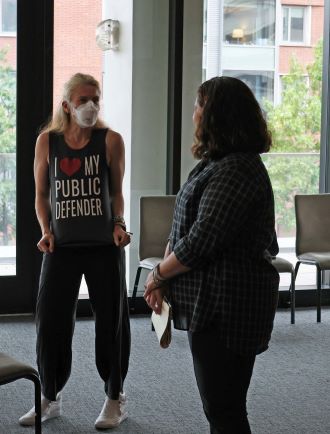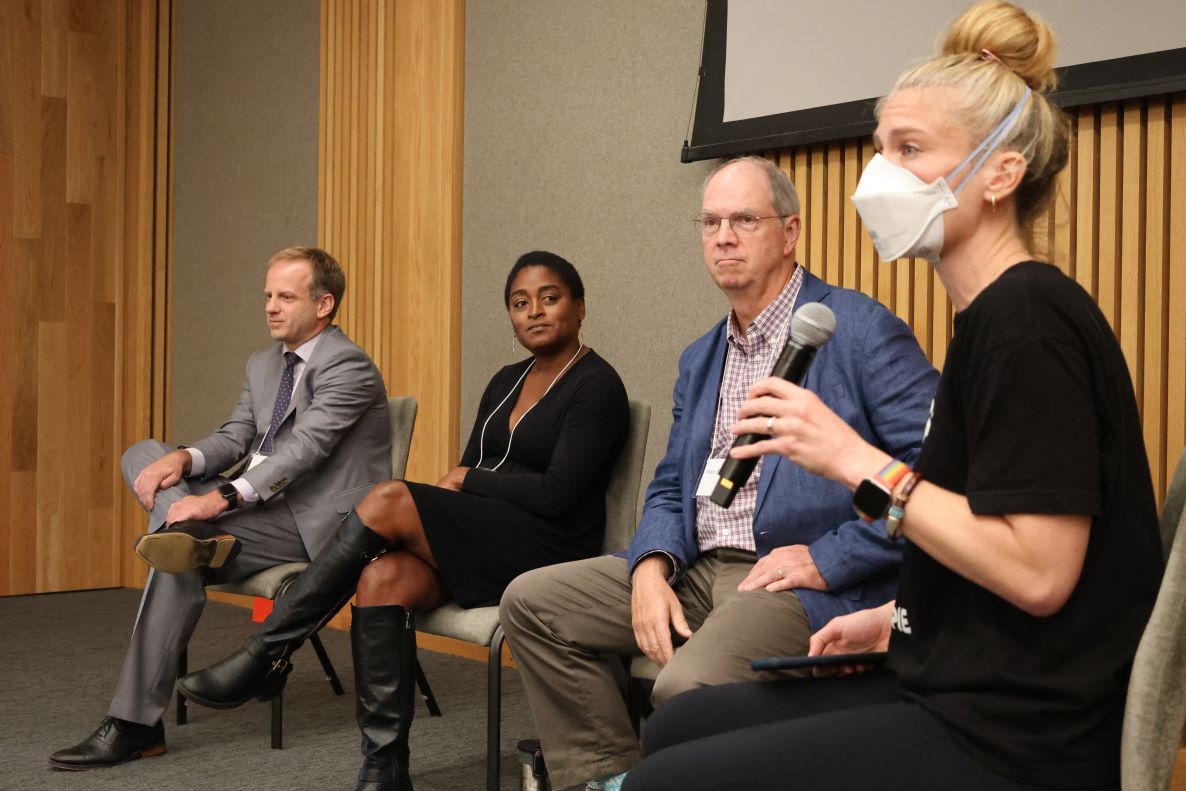Martin Washington isn’t a lawyer or a social worker, but the 22-year-old Morehouse College graduate is already a professional advocate for a group of underserved Philadelphians. Since July, Washington has worked with the Defenders Association of Philadelphia as part of its collaboration with the national non-profit Partners for Justice (PFJ).
PFJ advocates like Washington help individuals facing criminal charges navigate the legal system and address other oft-overwhelming issues that are holding them back, including a lack of housing or health care, or a need for education and employment. PFJ short-term goals: Reduce jail time and recidivism rates. Longer term, they want their clients to become the sort of stable, established citizens who build safer communities.
Washington’s — and all PFJ advocates’ — work is client-driven and hands-on. One day, he connects a man to a substance abuse treatment program. On another, he connects a woman with HVAC training. Martin has helped an incarcerated woman access medical tests; connect clients with anger management programs with bearing on custody agreements; and introduced clients to a gun violence program that offers participants a stipend.
Across all the offices PFJ works in, the organization says it has saved its 7,500 clients more than 1.6 million days of incarceration.
He visits incarcerated clients. He talks to families and other supporters on the outside. He helps individuals navigate an oft-confusing legal system where a single misstep — including missing a scheduled meeting because of a lack of transportation or filing incomplete paperwork — can result in time behind bars.
“It’s not passive work … I am constantly calling different programs and filling out forms and helping clients put plans into place (to move forward),” Martin says. “I’m helping people. One of the most fulfilling things is when a client says, I really appreciate it. I know you’re trying to help me.”

Bureaucracy doulas
PFJ’s collaborative defense model evolved from the idea of “holistic defense,” which co-founder Emily Galvin-Almanza practiced when she worked as a public defender in the Bronx. In 2018, PFJ launched a pilot program in two very different locales: Wilmington, DE, and Oakland, CA. Five years later, PFJ advocates are working in 27 offices — including Philadelphia and Delaware County. This rapid growth is expected to continue. (Since the program is so new in Philly, they have not provided information about number of clients or impact.)
PFJ measures its success by analyzing the nature and number of the services defender clients are getting and how much lower incarceration is for those clients — a combination of support and restoration benefitting public safety. For example, an advocate’s assistance in finding housing, accessing mental health care, or gaining employment can all make a person less likely to be re-arrested — and also less likely to go to prison or jail on their current case.
Across all the offices PFJ works in, the organization says it has saved its 7,500 clients more than 1.6 million days of incarceration. That is in part because, as 77 percent of defenders who have worked with PFJ state, many cases they work on have been dropped, dismissed or resolved without convictions. In 87 percent of cases in which PFJ advocates have helped public defenders file “mitigation” that includes goals, both misdemeanor and felony cases were resolved without incarceration.
But there’s also a financial benefit: PFJ estimates that every dollar spent on an advocate results in $3 to $6 potential savings because of reduced incarceration. PFJ estimates its work has also brought in over $10 million in government funding to (consistently underfunded) public defenders.
“Local governments are catching on fast that their public defenders have a role to play in public safety and public health,” Galvin-Almanza says.
Some have called the advocates “court doulas.” She prefers the term “bureaucracy doulas,” as the work advocates do extends well beyond the courtroom. “The scale of work that advocates do is astonishing,” she says. “Because even when something seems minor, it’s not that simple.”
Imagine, she says, that a judge decides a defendant should go to drug treatment, not jail. That means, among other things, finding a program that meets that person’s special needs, offers treatment in their language, and has a bed open. Galvin-Almanza knows one client who was released from prison and poised to enter rehab — then learned he needed a negative Covid test first. He had to be readmitted to lock-up for the testing.
“There’s no such thing as, You just do this,” she says.

Advocates wanted
PFJ’s advocacy program is an early career professional development program. Most of the advocates are recent college graduates, although PFJ advocacy does not require a college degree, just a college-level writing ability and a flair for analytical thinking. The average PFJ client has between two and seven outstanding issues, like housing problems, health needs and job training.
“We’re looking for that unique combination of tenacity and stubbornness, people who will park outside the Social Security office and not leave until they get what they came for, who will visit 27 shelters in one day,” Galvin-Almanza says. “We’re looking for people with creative problem-solving skills.”
Defenders Association of Philadelphia Chief Defender Keisha Hudson says she’s PFJ’s case management model impresses her.
“It’s not just referring a client to an agency or saying, Here are the places you should call for the services you need. It’s really connecting with the client and staying with them long term to be sure they’re accessing those services,” she says. “It’s: Let me make that appointment for you.
“One of the things they do that I find remarkable is the frequent check-ins: Are you getting the services we talked about? How are you doing with food, with housing, with health treatments? That follow-up is so important.”
PFJ advocates began working with the Delaware County Office of the Public Defender in August, 2022. Taylor Dunn, chief of the office’s pre-trial division, says the county’s five PFJ advocates have had great success helping clients complete two diversionary programs.
Before the advocates, one program had a success rate in the low 50th percentile. With the advocates onboard, almost 80 percent of participants were successful. The other saw its completion rate climb from about 35 to 50 percent.
“I can’t say enough about them,” Dunn says. “I see them working every day, providing direct services to clients and helping make their lives better.”
One advocate helped a client find subsidized housing. But when the woman moved in, she had no furniture. The advocate then connected the client to a used furniture bank.
“She had a bed and a dresser and, for the first time in her life, she has her own space,” Dunn says. “That’s pretty impactful.”
In Philadelphia, Martin is always looking for assistance programs to add to his resource list. He found one of the programs he’s now a fan of via a YouTube video.
Martin says seeing how his work has immediate impact is motivating. In college, he nixed a career in politics because such opportunities are fleeting. He plans to attend law school when his two-year PFJ stint ends.
“As a lawyer, I can help people understand and navigate the law,” Martin says. “But for me to be the best lawyer I can be, I want to have hands-on experience so that I can understand how the law directly impacts people and how we can truly help.”
![]() MORE CRIMINAL JUSTICE REFORM
MORE CRIMINAL JUSTICE REFORM





